Over the course of working in Silicon Valley for 20+ years I’ve met numerous VCs and known many PMs who have transitioned into VC careers. Product management has always struck me as one of the optimal backgrounds for VC. PMs think holistically about their products, their business, their industry, go to market, marketing, and of course their customers. We apply a lot of analysis, critical thinking, and customer touch to our work, and we know how to get the right products built by hook or by crook.
In conversations over the past couple months with John Gannon, the author of a leading VC career blog, I thought about my observation and built a hypothesis that product management career experience is a principal entryway into a VC career. Recently I decided to see if I was right and I looked at the data.
Product management is one of the best side doors into venture capital.
Some of the very best VCs by any measure were PMs in their early careers. E.g. Ben Horowitz of Andreessen Horowitz and Reid Hoffman of Greylock Partners were both product managers.
20% of all top VCs were PMs first in their early career jobs
THE HYPOTHESIS AND THE DATA
To see if the data proved or invalidated my hypothesis that PM is a great qualification into a VC career, I looked up a list of top 100 VCs from the New York Times and CB Insights. I dropped the list into a spreadsheet and went looking to fill in details. Fortunately LinkedIn is a great source of education and career details. I recorded undergraduate and graduate degrees and majors, plus the details of the first three career jobs listed for each. I also applied a ranking from Forbes to categorize universities attended.
THE FRONT DOOR TO VC
Venture capital has flourished and expanded in the last decade with an influx of new firms focused on different industries, funding rounds, and theses. It seems to have abounded in popularity. Overall however, there are still relatively few VC roles to be had. It’s a small industry. Even A16Z which is large by total headcount (550+) only has 15 general partners. Popularity paired with limited opportunity makes VC a difficult and therefore highly competitive career to enter. If you’ve ever tried to get into product management, this will sound like a very familiar story. On the difficulty scale, VC has far fewer overall roles compared to PM.
When a role has high impact, high risk, high leverage, high financial rewards, and low turnover, the criteria to get in can skyrocket. Looking at the data, the front door to a VC career is a MBA from an Ivy League or top 10 university, with a STEM undergraduate degree from a top 50 university, followed by early career experience in challenging critical thinking roles.
Popular early career roles observed within these top 100 VCs included Analyst, Founder, Engineer, Consultant, Associate, and Strategist . Sales, Marketing, Banking, and Sales Engineering were also present. Though there is a wide range of companies present in these early roles, it may not surprise you to see well-known companies like McKinsey & Company, Booz Allen Hamilton, Boston Consulting Group, Ernst & Young appear repeatedly for the strategy and consulting companies. Among tech company roles I saw eBay, HP, Microsoft, Google, and Apple. I was particularly interested to see names that were seminal in their day, but are no longer operating in their original from. E.g. Silicon Graphics, Skype, Good Technology, WebOS, LoudCloud, Netscape, and Sun Microsystems.
The magic formula for top tier VC derived from the data is =
+ STEM undergraduate degree from a top 50 university
+ Critical thinking career role at a prestige company
+ MBA degree from a top 10 university
+ Opportunity, luck, and timing don’t hurt either for good measure
If that sounds like an incredibly difficult set of criteria, I would not disagree. There is a silver lining however. Even among the top 100 VCs, some of them didn’t match this criteria themselves. Bill Gurley did it and he’s ranked #1 on the list. He attended University of Florida and University of Texas. Chris Sacca did it too. He went to Georgetown for both his degrees and did not get a MBA. He’s ranked #2. Both of them are deadly smart by all accounts. Trends don’t equal axioms.
THE PM SIDE DOOR
Did you know that 20% of all these top VCs had product manager jobs early in their career? That frequency surprised me too. PM was the most frequent early job role in the data set. This is the experience side door into VC and it makes sense when you consider the range of responsibilities PMs own. PM is a great training ground for executive leadership, CEO roles, and VC roles. The second and third most popular early career roles were Founder (18%) and Analyst (17%). All three of these roles demand critical thinking, analysis, business acumen, the ability to make business-defining decisions, discovery and creation of markets, determination, customer intimacy, and the ability to get the most important things done. Those attributes feel very in line with venture career skills.
Founders and analysts are the other two principal side doors into future VC careers. These careers have a lot in common with PM for the types of responsibilities they own. I’ve written before that founders are the de facto first PM for any new startup. These three roles together add up 55.9% of early top VC career roles and produce a very strong trend for the types of people that ultimately land in VC careers.
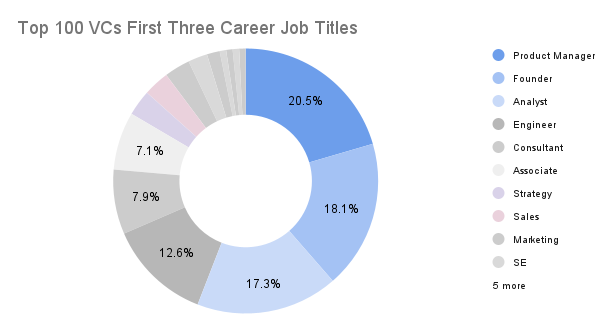
UNDERGRADUATE UNIVERSITY TRENDS
Looking at the data in more detail, tops VCs value education. They all have an undergraduate degree. They also go to the best undergraduate universities. 33% of all VCs attended an Ivy League undergraduate university. The next 46% after that went to a Forbes top 100 school.
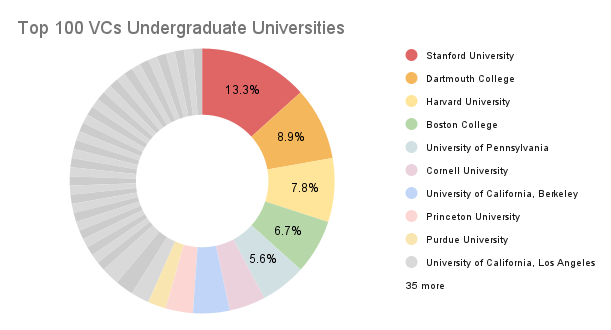
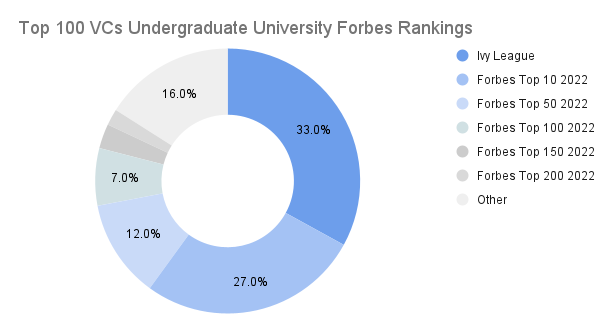
Over half of VCs obtained an undergraduate STEM degree. Nearly another quarter studied some combination of Finance, Economics, or Business. It’s nice to see that 21% studied Liberal Arts and that VC as an industry doesn’t only filter for STEM degrees. Many VCs had philosophy, history & literature, government, and psychology degrees.
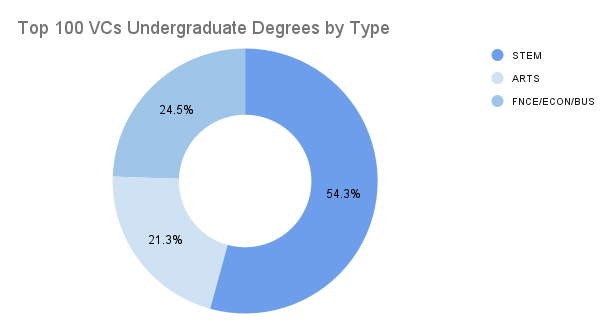
GRADUATE UNIVERSITY TRENDS
Graduate school was also quite popular among top VCs. 78% get graduate degrees. They also doubled down to primarily go to only the highest-ranked universities. 57.9% of all of them went to three universities: Stanford, Harvard, and MIT for graduate school. 27% of them overall went to Ivy League universities. Another 46% went to a Forbes, US top 10, non-Ivy ranked university. Very few come from universities ranked lower than the Forbes top 50 universities. Graduate education school is a conspicuous filter criterion for venture capital hiring.
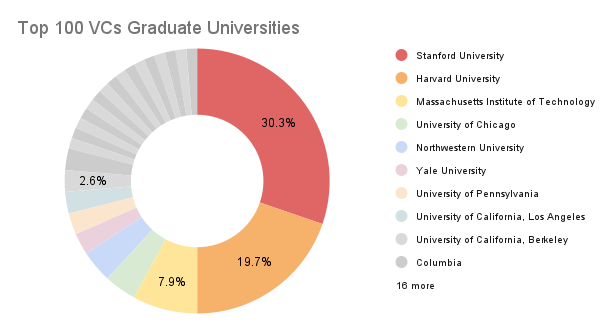

Another overwhelming trend is that top VCs get MBA degrees. 66% of all of them got a MBA. Another 16% got a STEM masters degree. 5% went to law school. A small handful got PhDs or dual JD/MBA degrees. The MBA appears to be a critical minimum qualification level, followed by STEM, and law.
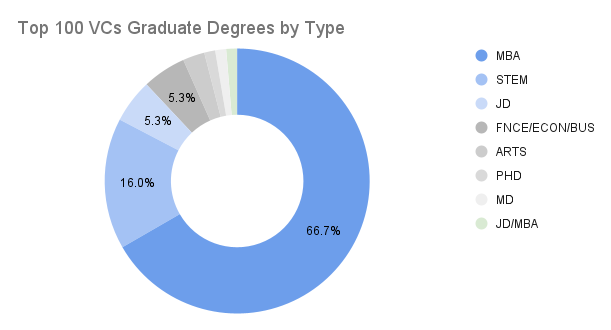
PM TO VC AND BEYOND
Careers are interesting and long. If you only look at the data you might think that top VCs planned their career from high school and tracked all the way through perfectly. I don’t believe this is true, however. Having listened to many interview podcasts and YouTube, it’s clear that one door led to another even for them. School selection and admission is one door opener but it still doesn’t dictate what career you choose and where you ultimately go.
If you’re already working and your school days are behind you, you will still have many opportunities ahead of you. I personally think that product management is a fantastic career. I love that PM is a strong feeder into VC along with being an analyst or a founder. The skills you need and will learn to be a great PM will have compounding effects on your career long term. Maybe the future opportunity is VC, C-suite, founder, philanthropist, or something altogether different.
DATA SOURCES
Top 100 Venture Capitalists: List from The New York Times and CB Insights
![]() Google Sheets: Data, Analysis, and Charts. Subscribe to get free access to the source data for reviewing, slicing, and dicing yourself. Just email me at luke@lukecongdon.com after you subscribe and I’ll send it out asap.
Google Sheets: Data, Analysis, and Charts. Subscribe to get free access to the source data for reviewing, slicing, and dicing yourself. Just email me at luke@lukecongdon.com after you subscribe and I’ll send it out asap.
- The New York Times and CB Insights data for the top 100 VCs was published in February, 2018. It’s a few years old, but as a selection of top VCs I feel this is valid enough data sample to draw career and education trend data from.
- I used a 2022 Forbes ranking of US-based universities to distinguish universities. Several top VCs went to non-US universities which are not captured and ranked in the Forbes US-centric rankings.
- I separated Ivy League out as this is a well-known group of elite universities. The top 10 ranked universities according to Forbes 2022 do include 4 Ivy League schools (Princeton, Columbia, Yale, UPenn).
- I used LinkedIn and public profiles to verify education and self-reported career history. With careers spanning decades, many top VCs and professionals commonly selectively list their per-role job histories. The ‘First three jobs’ results excludes VCs whose only listed jobs were Executives, Investors, or Partners. These likely don’t reflect first career roles. I also excluded internships.
- Job titles vary immensely. To cleanse the data for reporting, job roles have been bucketed into groups. University degrees also have some variability and have harmonized as well for reporting.
- Job titles were summed across the first three listed roles which do count any single person with the same job function more than once. This was done uniformly across all job roles.
ABOUT LUKE
Luke Congdon is a career product manager living and working in Silicon Valley since 2000. His areas of focus include enterprise software, virtualization, and cloud computing. He has built and brought numerous products to market including start-up MVPs and billion-dollar product lines. Luke currently lives in San Francisco. To contact, connect via luke@lukecongdon.com or https://www.linkedin.com/in/lukecongdon/.
